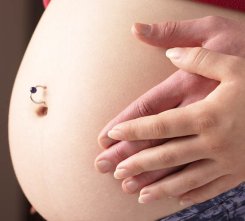 By analyzing sperm from men of various ages, scientists from the McKusick-Nathans Institute for Genetic Medicine at Johns Hopkins have discovered that older men's sperm is more likely to contain disease-causing genetic mutations that also seem to increase a sperm's chances of fertilizing an egg.
By analyzing sperm from men of various ages, scientists from the McKusick-Nathans Institute for Genetic Medicine at Johns Hopkins have discovered that older men's sperm is more likely to contain disease-causing genetic mutations that also seem to increase a sperm's chances of fertilizing an egg. The findings, which appear in the American Journal of Human Genetics, emerged during efforts to explain why a rare genetic disease is more common in children born to older fathers. The disease, Apert syndrome, leads to webbed fingers and early fusion of the skull bones, which must be surgically corrected.
The researchers found that mutation rates in sperm increased as men aged, but not enough to fully account for the increased incidence of Apert syndrome in children born to older fathers, leading to the suspicion that the disease-causing mutations confer some benefit to the sperm, despite the mutations' effects on the resulting baby.
"Mutations causing this disease occur more frequently in the sperm of older men, but the mutation rate isn't quite as high as the incidence of Apert syndrome," says Ethylin Jabs, director of the Center for Craniofacial Development and Disorders at Johns Hopkins. "For some reason, a sperm with one of these mutations is more likely to be used to make a baby than normal sperm."
While Apert syndrome itself affects only 1 in 160,000 births, the scientists believe a combination of increased mutation rate and "mutation advantage" might also be behind some of the 20 or so other genetic conditions linked to older fathers, including achrondroplasia dwarfism. These disorders begin to increase rapidly with the father's age at about the same time as maternal risks increase - age 33 to 35. Most of the evidence for paternal age effects has come from determining how many children with these conditions are born to fathers of various ages.
For the current study, the Hopkins scientists studied sperm from 148 men of various ages and looked for two genetic changes that are responsible for 99 percent of Apert syndrome cases. They found that men over 60 were, on average, three times as likely as men under 30 to have sperm with at least one of these changes.
"Men over age 52 are six times more likely than a 27-year-old to have a child with Apert syndrome, so the mutation rate alone can't account for the condition's link to paternal age," says first author Rivka Glaser, a graduate student at Johns Hopkins.
"Literally hundreds of millions of sperm are made in each batch, so in most cases there are still many normal sperm available," adds Jabs, also a professor of pediatrics. "Because the few mutated sperm are more likely to be used to make a baby than would be expected, the mutation must provide them some competitive advantage over their normal counterparts."
The two genetic mutations that cause most cases of Apert syndrome affect a protein called fibroblast growth-factor receptor-2 (FGFR2). The mutated versions of FGFR-2 don't bind to its usual targets with the same affinity, perhaps contributing to the sperm's likelihood of fertilizing an egg, the researchers suggest.